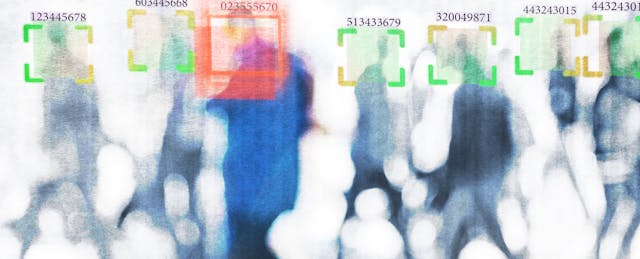A satirical student newspaper recently wrote that Stanford University installed facial recognition cameras in the front of some lecture halls to take attendance and analyze the expressions on students’ faces.
Though that particular instance isn’t true, the scenario taps into the very real concerns that privacy activists have about the potential application of face surveillance software on college campuses.
Indeed, last week saw the launch of “Ban Facial Recognition on Campus,” a nationwide campaign from the nonprofit advocacy organizations Fight for the Future and Students for Sensible Drug Policy. The movement aims to rally students, faculty and other stakeholders to urge transparency about how institutions of higher ed already use facial recognition tools and press colleges to ban future use of the technology in campus settings.
Campaign organizers oppose facial recognition because they believe the technology could violate students’ privacy without their consent and exacerbate bias toward and discrimination against minorities, says Erica Darragh, board member for Students for Sensible Drug Policy who graduated from the University of North Georgia in 2018.
Even if universities use this kind of surveillance for seemingly innocuous purposes, she adds, the sensitive data such systems could collect would be vulnerable to hacking and misuse.
“Once you create these massive databases of biometric data, they’re always going to be a target,” Darragh says. “Your system is only as strong as its weakest link. It’s almost inevitable that something is going to be breached—it’s just a matter of when.”
Concerns Began in K-12
With little fanfare or regulation, facial recognition technology has been adopted by private companies, police departments and government agencies in the U.S. and abroad, largely for purposes of surveillance and security, as the Financial Times reported last fall. These entities draw on databases of faces, some scraped from photos posted to the internet. One company called Clearview AI has built a database of more than 3 billion images that is used by more than 600 law enforcement agencies, according to a recent story in the New York Times.
This kind of technology has also already entered the world of education. While researchers are testing novel applications of facial recognition, such as scanning student faces for boredom, some K-12 schools have installed cameras and software to try to deter crime.
Advocates tout the potential facial recognition tools have to improve safety, increase convenience and reduce rates of fraud. Yet proof that these applications are effective is hard to come by. Claims that some surveillance companies make to market their products have been disputed by independent research. And in December, a study published by the U.S. Department of Commerce’s National Institute of Standards and Technology found that facial recognition algorithms are generally less accurate at identifying women and racial minorities.
Concerns about privacy, efficacy and bias have motivated some parents to push back against efforts to install facial-recognition tools in elementary and secondary schools, says Amelia Vance, senior counsel and director of education privacy for the Future of Privacy Forum.
“It is a very slippery slope once you adopt a technology, and we don’t have enough evidence that facial recognition works for its primary purpose of security—let alone anything else at the moment—for the cost or the privacy violations or potential abuses down the road to be worth it,” Vance says.
These advocacy efforts in K-12 schools, she adds, may have influenced the new college campaign.
A Preemptive Campaign
At George Washington University, in Washington D.C., the administration doesn’t use facial recognition tools. And leaders of the campus branch of Students for Sensible Drug Policy want to keep it that way. Drawing on the national campaign, they plan to advocate that the university’s student government ban the technology.
“If we’re being watched all the time, who knows what is going to happen to academic discourse?” says Abhi Dewan, a student who leads the George Washington branch of Students for Sensible Drug Policy. “Why are we running this experiment on a group of young people who are trying to get a rich education with a bunch of diverse perspectives?”
So far, academic research has brought facial recognition projects to a few college campuses, including Duke University and the University of Colorado. Otherwise, though, institutions of higher education mostly haven’t adopted the technology.
That means the new national campaign, like the localized one at George Washington University, is largely preemptive.
“There are very few campuses actively using facial recognition,” Darragh says. “Our goal is to draw a line in the sand and prevent this from happening behind closed doors.”
That’s not to say surveillance isn’t happening at colleges in other ways. Some institutions of higher ed can track students through their use of WiFi or mobile phones and by encouraging (or requiring) them to use student ID cards to swipe into events.
“There’s already a really strong current of surveillance in higher education, and this”—meaning facial recognition—“is the cherry on top,” Darragh says.
Even if facial recognition on campus remains mostly fodder for satire and speculation, campaign organizers see another purpose for student advocacy: generating support for larger efforts to ban facial recognition more broadly.
“Campuses are a powerful place to begin this organizing,” Darragh says. “We already know how to make change here.”
The cause is gaining momentum. A similar preemptive strategy is proving successful for privacy advocates in California, who have helped to pass privacy laws in more than two dozen of the state’s cities and counties, including tech hubs like San Francisco.
And at the federal level, last week the congressional Committee on Oversight and Reform held a hearing on facial recognition technology, its third in less than a year. Chairwoman Carolyn B. Maloney, a democrat from New York, announced a commitment to introducing “common-sense” facial recognition legislation “in the near future.”


